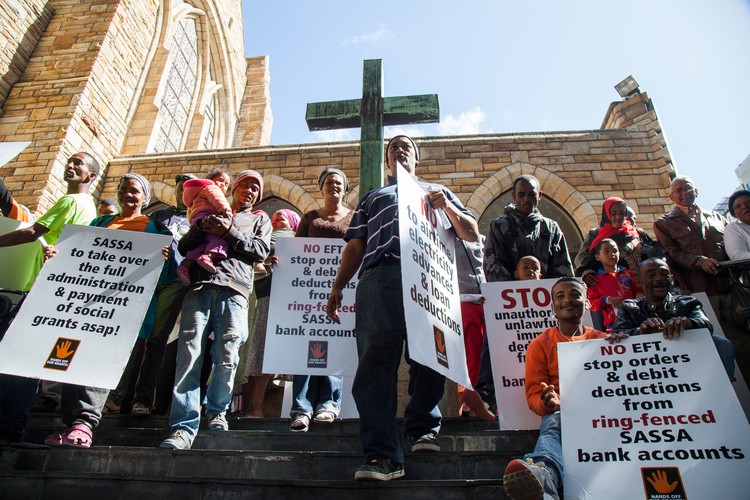Only one third of SASSA disputed deductions resolved
MPs grill agency on damning annual report
The South African Social Security Agency (SASSA) says only 5,343 of 14,683 disputed deductions, i.e. 36%, made by grant beneficiaries in the last financial year were resolved. The agency attributed this poor rate to its “reliance on [the current service provider] Cash Paymaster Services to resolve all reported disputes”.
Social grant recipients frequently complain that inexplicable deductions are made from the accounts into which their grants are deposited. GroundUp has published numerous reports on this issue.
While presenting the agency’s annual report to Parliament’s Portfolio Committee on Social Development on Thursday, SASSA executive manager Raphaahle Ramokgopa assured MPs that the agency’s new system “would not allow for any deductions” on Sassa accounts.
But MPs were not convinced and grilled SASSA on its failure to deal with the current backlog of complaints. DA MP Karen Jooste said, “You went into business with a private company and you know they are in it to make money. The issue of deductions is your fault and needs to be dealt with by SASSA.”
ANC MP Hope Malgas said SASSA’s communication strategy to its beneficiaries “was just not working”. She continued: “During my constituency period, I received a number of complaints about illegal deductions. There was nothing we could do because we were told beneficiaries had to fill out a form themselves. You talk about Tweets and Facebook, but how do you communicate with senior citizens? This is problematic,” she said.
In response, SASSA executive manager for grant payments Dianne Dunkerley acknowledged that the current disputes resolution system and their direct communication with beneficiaries was flawed. “We know that there is a serious problem with deductions … Beneficiaries had no choice over their SASSA card account and for this reason we are fighting to have some responsibility over them,” she said.
She said the agency has been visiting pay points and advice offices. “We inform beneficiaries not to panic because the SASSA card is not expiring in December, and also we do not provide or endorse any financial products such as loans or airtime,” she said.
Dunkerley said if beneficiaries are unable to fill out dispute resolution forms, they need to complete an affidavit at their nearest police station and take it to a SASSA office. “We can then register the dispute and follow up to make sure that it is resolved. While investigating a number of disputes on deductions we have found that the beneficiary acknowledges taking the loan, but not in all cases. Where we find that no authority was given for the deduction, we then facilitate that a refund be made to the beneficiary,” she said.
Increase in grant applications
Ramokgopa said the agency had received an “unprecedented” number of new grant applications in the financial year which ended in March 2017.
“Our usual average of applications is between 1.1 and 1.3 million applications, but we have processed just over two million. We are still uncertain why there was this increase, but during the year under review we made use of the Integrated Community Registration Outreach Programmes which was used to reach rural areas with mobile units. We believe this could also have contributed to the increase in applications,” she said. This spike in applications would not however impact its budget as there were also grants which left the system due to deaths or children turning 18,” she said.
Ramokgopa said that the number of grants paid also increased from 16,991,634 to 17,507,849.
How soon are grants paid after application?
Dunkerley said: “All new grant applications are processed from the day the application is made except foster care grants which are processed from the date of the court placement. The amount of money people will get on their first payment will depend on when in the cycle they applied. If you apply, for example in September before the month end cut off, you will be paid in October the money for that month and the few days from the date of application in September. After the cut-off period, beneficiaries would only be paid in November and will receive money for that month and the few days since the application date in October.”
Support independent journalism
Donate using Payfast

Don't miss out on the latest news
We respect your privacy, and promise we won't spam you.
Next: Education department’s “accelerated” school infrastructure programme hardly moves
Previous: Mining company has eyes on West Coast National Park, say activists
© 2017 GroundUp. 
This article is licensed under a Creative Commons Attribution-NoDerivatives 4.0 International License.
You may republish this article, so long as you credit the authors and GroundUp, and do not change the text. Please include a link back to the original article.

